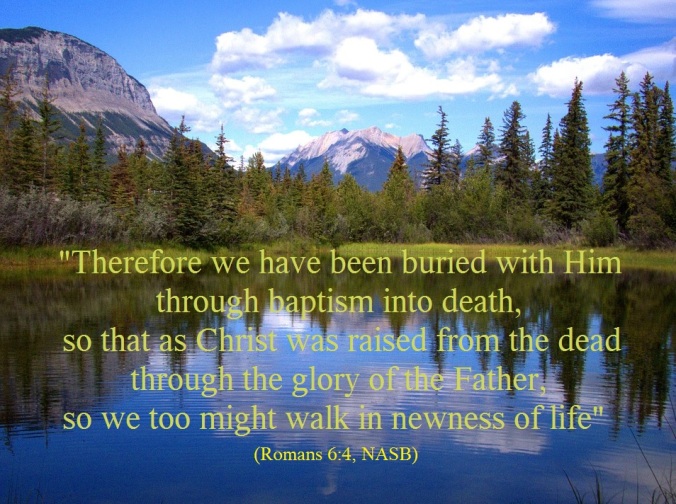“Go therefore and make disciples of all the nations…teaching them to observe all that I commanded you; and lo, I am with you always, even to the end of the age” (Matthew 28:19-20, NASB).
——————–
Contents:
1) Sarah’s Faith (Tom Edwards)
——————–

-1-
Sarah’s Faith
Tom Edwards
Isn’t it something the way you can read over the same Bible passages many times through the years — and then, decades later, suddenly see some of those verses stand out in a way they had not done so before? This I experienced recently concerning the faith of Sarah.
Her name at the time was Sarai, and her husband was Abram, before God changed her husband’s name to “Abraham” (Gen. 17:5) and hers to “Sarah” (v. 15). (The name “Abram” is said to mean ”exalted father,” while “Abraham” means “father of a multitude” [Brown-Driver-Briggs’ Hebrew Definitions.])
It was to Abraham that God spoke of these name changes; and after mentioning Sarai’s name to “Sarah,” the Lord then told Abraham that she would be blessed by God and bear a child and, thus, become “a mother of nations” with “kings of peoples” that “will come from her” (v. 16).
On hearing this, “…Abraham fell on his face and laughed”; and he “said in his heart, ‘Will a child be born to a man one hundred years old? And will Sarah, who is ninety years old, bear a child?’” (v. 17).
When the LORD appeared to Abraham again by the oaks of Mamre and said, “I will surely return to you at this time next year; and behold, Sarah your wife will have a son,” “Sarah was listening at the tent door, which was behind him” (Gen. 18:10) – and she “laughed to herself” over the thought of having a child at such an old age (v. 12). And not only had Sarah been “old, advanced in age” and way “past childbearing” (v. 11), but she had also been “barren” (Gen. 11:30). So she was “sterile,” as that Hebrew word (“aqar”) is also defined (James Strong and Brown-Driver Briggs), and, therefore, not able to conceive children even in her younger days.
With these factors against her, what is the possibility that she could have a child? Thinking from merely a physiological standpoint, we would conclude that there is nothing she could do about it. And, perhaps the thinking would also be, that for her to conceive a child, it would certainly have to be something totally up to God. But was that how it was?
The verse that stood out to me recently is in Hebrews 11 – that great “Hall of Faith” chapter. In each of the examples, faith had prompted certain individuals to do specific things. They had an active, obedient faith – rather than the “dead” faith that James speaks of in James 2. For instance, in Hebrews 11 (all emphases mine) we see that…
“By faith Abel OFFERED a better sacrifice than Cain…” (v. 4).
“By faith Noah…in reverence PREPARED an ark for the salvation of his household…” (v. 7).
“By faith Abraham… OBEYED by going out to a place…” (v. 8).
“By faith Abraham, when he was tested, OFFERED up Isaac…” (v. 17).
“By faith Moses, when he was born, WAS HIDDEN for three months by his parents…” (v. 23).
“By faith Moses… REFUSED to be called the son of Pharaoh’s daughter, CHOOSING rather to endure ill-treatment with the people of God than to enjoy the passing pleasures of sin, considering the reproach of Christ greater riches than the treasures of Egypt… By faith he LEFT Egypt, not fearing the wrath of the king; for he ENDURED, as seeing Him who is not seen. By faith he KEPT the Passover…” (vv. 24-28).
“By faith they PASSED through the Red Sea…” (v. 29).
“By faith the walls of Jericho fell down after they had been ENCIRCLED for seven days” (v. 30).
It is said of Gideon, Barak, Samson, Jephthah, David, Samuel and the prophets that they “…by faith CONQUERED kingdoms, PERFORMED ACTS of righteousness, obtained promises, SHUT the mouths of lions, QUENCHED the power of fire, ESCAPED the edge of the sword, from weakness were made strong, became mighty in war, PUT foreign armies TO FLIGHT” (vv. 32-34).
“…others were tortured, not accepting their release, so that they might obtain a better resurrection; and others experienced mockings and scourgings, yes, also chains and imprisonment. They were stoned, they were sawn in two, they were tempted, they were put to death with the sword; they went about in sheepskins, in goatskins, being destitute, afflicted, ill-treated (men of whom the world was not worthy), wandering in deserts and mountains and caves and holes in the ground. And all these, having gained approval through their faith…” (vv. 35-39).
All of these individuals lived a life of faith. That faith prompted them in doing God’s will and standing for what was right — and, as seen in the above paragraph, they did so even in spite of the poverty, persecution, or death it had led to.
But if you take away that obedience, would any of these individuals then be mentioned in this “faith” chapter? What good would their faith have been had they not obeyed? James answers that: “faith without works is dead” (Jms. 2:26). It would then be “useless” (v. 20). Therefore, “a man is justified by works and not by faith alone” (v. 24).
Though various men of faith are cited in Hebrews 11, there are only two women who are mentioned by name – and one of them is Sarah! And this is the passage that recently became more significant. It is Hebrews 11:11, which declares, “BY FAITH even Sarah herself received ability to conceive, even beyond the proper time of life, SINCE SHE CONSIDERED HIM FAITHFUL WHO HAD PROMISED” (emphasis mine).
I imagine we would think that for a woman in Sarah’s time to not only be past the years of childbearing, but to also have been barren through her life, that the only way she could conceive a child would require intervention from God – and He alone! But from Hebrews 11:11, we find that Sarah’s being able to conceive also involved her faith in God who had given that promise! So it was not all entirely up to God! For Sarah had to believe!
Some might say, though, but the promise was given before she even believed. But that would only be from our linear perspective of time with its chronological order. Would not, however, the eternal God, who has proven His ability to know of future events and even of how people will turn out to be, also know that Sarah would believe in such a promise?
And can we not also liken this to the promise that God had given Joshua concerning Jericho? In Joshua 6:2, the LORD said, “See, I have given Jericho into your hand, with its king and the valiant warriors.” But Israel hadn’t actually taken the city yet. And in order to do so, the LORD gave specific instructions in verses 3-5: “You shall march around the city, all the men of war circling the city once. You shall do so for six days. Also seven priests shall carry seven trumpets of rams’ horns before the ark; then on the seventh day you shall march around the city seven times, and the priests shall blow the trumpets. It shall be that when they make a long blast with the ram’s horn, and when you hear the sound of the trumpet, all the people shall shout with a great shout; and the wall of the city will fall down flat, and the people will go up every man straight ahead.”
And this they did. Then “…the wall fell down flat, so that the people went up into the city, every man straight ahead, and THEY TOOK THE CITY. They utterly destroyed everything in the city, both man and woman, young and old, and ox and sheep and donkey, with the edge of the sword” (vv. 20,21, emphasis mine).
So though God had given Jericho into Joshua’s hand (v. 1), when was it that they actually “took the city” (v. 20)? It was after they obeyed the instructions God had given them concerning this (vv. 3-5)!
As we had seen, Hebrews 11 sums that up by just saying, “By faith the walls of Jericho fell down after they had been encircled for seven days.” But keep in mind that that doesn’t mean the additional things God had commanded of them in Joshua 6 were not necessary for that result. For those other requirements were also included in their obedient faith – and needed to be.
So God also promised to Abraham and Sarah a child and said to Abraham that “you shall call his name Isaac” (Gen. 17:19).
Though Abraham also had laughed at first in thought of having a child at such an old age, yet he also went on in faith, believing the promise: “(as it is written, ‘A FATHER OF MANY NATIONS HAVE I MADE YOU’) in the presence of Him whom he believed, even God, who gives life to the dead and calls into being that which does not exist. In hope against hope he believed, so that he might become a father of many nations according to that which had been spoken, ‘So shall your descendants be.’ Without becoming weak in faith he contemplated his own body, now as good as dead since he was about a hundred years old, and the deadness of Sarah’s womb; yet, with respect to the promise of God, he did not waver in unbelief but grew strong in faith, giving glory to God, and being fully assured that what God had promised, He was able also to perform” (Rom. 4:17-21).
And looking again at Sarah’s involvement as to the result: “BY FAITH even Sarah herself received ability to conceive, even beyond the proper time of life, SINCE SHE CONSIDERED HIM FAITHFUL WHO HAD PROMISED” (Heb. 11:11, emphasis mine). So it was required of Sarah to truly believe God’s promise in order for her to conceive Isaac — and not just be totally up to God. And, as the Bible record shows, she not only believed, but is also included in that great “Hall of Faith” chapter for having done so!
(All Scriptures from the NASB.)
——————–
The Steps That Lead to Eternal Salvation
1) Hear the gospel, for that is how faith comes (Rom. 10:17; John 20:30,31).
2) Believe in the deity of Christ (John 8:24; John 3:18).
3) Repent of sins (Luke 13:5; Acts 17:30).
4) Confess faith in Christ (Rom. 10:9,10; Acts 8:36-38).
5) Be baptized in water for the remission of sins (Mark 16:16; Acts 2:38; 22:16; Rom. 6:3,4; Gal. 3:26,27; 1 Pet. 3:21).
6) Continue in the faith, living for the Lord; for, if not, salvation can be lost (Heb. 10:36-39; Rev. 2:10; 2 Pet. 2:20-22).
——————–
Tebeau Street
CHURCH OF CHRIST
1402 Tebeau Street, Waycross, GA 31501
Sunday services: 9:00 a.m. (Bible class); 10 a.m. & 5 p.m. (worship)
Wednesday: 7 p.m. (Bible class)
evangelist/editor: Tom Edwards (912) 281-9917
Tom@ThomasTEdwards.com
http://thomastedwards.com/go (Older version of Gospel Observer website without pictures, but back to March 1990)
http://tebeaustreetchurchofchrist.org/
http://ThomasTEdwards.com/audioser.html (audio sermons)















